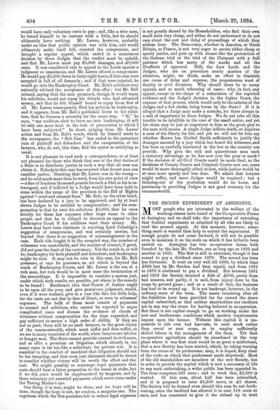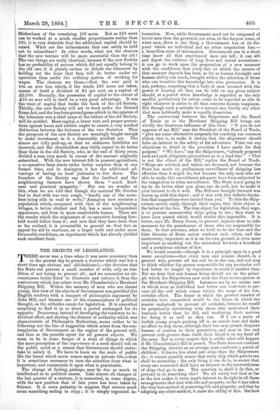THE SECOND EXPERIMENT AT ASSINGTON.
MOST people who are interested in the welfare of the working-classes have heard of the Co-operative Farms at Assington, and we shall take the importance of extending that fruitful experiment as admitted by all who are likely to read the present appeal. At this moment, however, some- thing more is wanted than help to extend the experiment. If enough people do not come forward, it will not be possible even to maintain it on the scale on which it has hitherto been carried on. Assington has two co-operative farms, both founded by the late Mr. Gurdon, one as long ago as 1829 and another in 1853. The first is still in existence, though it has ceased to pay a dividend since 1879. The second has been less fortunate. It went on very well till 1860, by which time £600 lent by Mr. Gordon had been repaid, and from 1861 to 1879 it continued to pay a dividend. But between 1861 and 1879 the Society incurred a debt of £600, partly from bad seasons, and partly, it is said, from injury done to the crops by ground game ; and as a result of this, the business has had to be wound up. It is not bankrupt, however, in the ordinary sense of the term. The assets remaining after all the liabilities have been provided for far exceed the share capital subscribed, so that neither shareholders nor creditors are in any way the worse for having believed in co-operation. But there is not capital enough to go on working under the new and burdensome conditions which modern requirements impose upon the farmer. Without this capital it is im- possible to tide over bad harvests, to raise stock rather than cereal or root crops, or to employ sufficiently skilled labour in the management of the farm. Yet that co-operative agriculture should be abandoned in the very place where it was first tried would be so great a misfortune, that a new Society has been started, which, by taking warning from the errors of its predecessor, may, it is hoped, keep clear of the rocks on which that predecessor made shipwreck. Most of the old shareholders are members of the new Society, but in order to provide the capital which is now a necessary of life to any such undertaking, a wider public has been appealed to. The farm comprises 223 acres ; and to work this, £2,500 is wanted. Of this sum, about half has been subscribed, and it is proposed to raise £1,250 more, in £1 shares. The Society will be formed even should this sum be not forth- coming, since the landlord has allowed it to rent 120 acres at once, and has consented to give it the refusal up to next IMarch 29, 1884.] Michaelmas of the remaining 103 acres. But as 223 acres can be worked at a much smaller proportionate outlay than 120, it is very desirable that the additional capital should be raised. What are the inducements that can safely be held out to subscribers ? In other words, what are the chances that the new venture will be more successful than the old The two things are really identical, because if the new Society has no probability of success which did not equally belong to the old one, it is plainly useless to delude the labourers by holding out the hope that they will do better under co- operation than under the ordinary system of working for wages. The chances are these,—first, the rent paid is 10s. an acre less, which, if the whole 223 acres are taken, means of itself a dividend of £4 per cent. on a capital of
£ 2,500. Secondly, the possession of capital to the extent of £ 10 an acre will in itself be a very great advantage. It was the want of capital that broke the back of the old Society. Thirdly, the new Society will set to work under the Ground Game Act, and the loss from ground game,which in the opinion of the labourers was a chief cause of the failure of the old Society, will be avoided. More capital, a lower rent, and proper precau- tions against hares and rabbits ought to ensure a very marked distinction between the fortunes of the two Societies. Thus the prospects of the new Society are seemingly bright enough to make investment in it a reasonably prudent act. The shares are fully paid-up, so that no unknown liabilities are incurred, and the shareholders may fairly expect to do better than those in the old Society, who, at the end of thirty years, divided a sum very much in excess of the amount originally subscribed. With the new interest felt in peasant agriculture, a co-operative farm starts under better auspices than at any former time, and in Assington it has the additional ad- vantage of having no local jealousies to live down. The founders of the Society say that the landlord and the neighbouring farmers have shown them "much kind- ness and practical sympathy." Nor can we wonder at this, when we are told that though the material Mr. Gurdon had to deal with was very rough, "hardly any of the mem- bers being able to read or write," Assington now contains a population which, compared with that of the neighbouring villages, is better clothed and fed, has a more independent appearance, and lives in more comfortable homes. These are the results which the originators of co-operative farming fore- told would follow from it ; and now that they have been thus so far realised, it is permissible to ground on that fact an appeal for aid to continue, on a larger scale and under more favourable conditions, an experiment which has already yielded such excellent fruit.



































 Previous page
Previous page